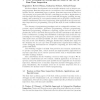Free Online Productivity Tools
i2Speak
i2Symbol
i2OCR
iTex2Img
iWeb2Print
iWeb2Shot
i2Type
iPdf2Split
iPdf2Merge
i2Bopomofo
i2Arabic
i2Style
i2Image
i2PDF
iLatex2Rtf
Sci2ools
102
click to vote
ECOOPW
2003
Springer
2003
Springer
Advancing the State of the Art in Run-Time Inspection
levels of abstraction. Lacking well-established technologies and models for representing and accessing program dynamics, tools must use ad-hoc mechanisms. This limits reuse and interoperability. De facto standards for run-time inspection such as the Java Platform Debugger Architecture (JPDA) have improved the situation but do not cope with all requirements. Implementers seeking to create debugging environments for ubiquitous computing are faced with even greater difficulties. The workshop sought to identify best practices and common requirements, to specify conceptual data, control models and implementation approaches for run-time inspection and to discuss practical issues such as standardized APIs and data exchange formats. The contributions for the workshop covered a wide range of topics. We divided the contributions into two sessions: classical application of run-time inspection and novel architectures made possible by the expanded use of run-time inspection. Classical uses of run-t...
| Added | 06 Jul 2010 |
| Updated | 06 Jul 2010 |
| Type | Conference |
| Year | 2003 |
| Where | ECOOPW |
| Authors | Robert E. Filman, Katharina Mehner, Michael Haupt |
Comments (0)

